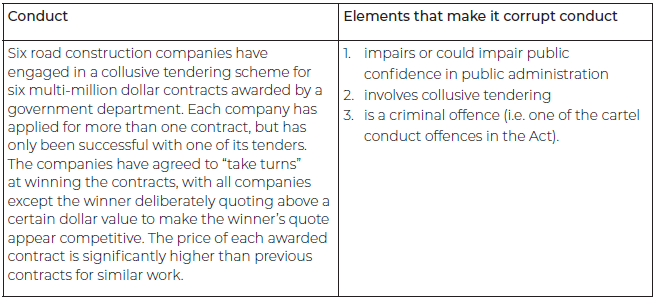08 June 2021
8 min read
#Dispute Resolution & Litigation, #Competition & Consumer Law, #Government, #Procurement
Published by:

Government tenders are incredibly lucrative for private sector tenderers to secure. This is particularly so given the significant procurement activity that all levels of government are engaging in this economic recovery phase from the COVID-19 pandemic.
The lucrative nature of these government procurements gives rise to a temptation by a tenderer or tenderers to try and manipulate the bidding for such government tenders through “bid rigging”.
This article provides you with an overview of “bid rigging” conduct, recent ACCC enforcement action for bid rigging cartel conduct arising from government procurement activity and tips for government lawyers to detect and deter such conduct occurring on your procurement.
So what is “bid rigging”?
Bid rigging refers to the conduct of competitors conspiring among themselves to determine how they ought to respond in a bidding process instead of competing fairly. It can also relate to an “attempt” to conspire. According to Public Procurement Toolbox’s ‘Guidelines for detecting bid rigging in public tenders’ here, some examples of bid rigging include:
The risks of bid rigging are high and to the detriment of the procuring entity or even the greater public. For example, if a government department pays an inflated price for the goods or services it procured, the burden of the reduced quality or additional costs will likely be borne by Australian taxpayers.
Cartel conduct
Bid Rigging is one form of cartel conduct under the Competition and Consumer Act 2010 (Cth) (Act)
Cartel conduct is anti-competitive conduct and exists when there is a provision in a contract, arrangement or understanding between competitors that has the purpose or effect of fixing prices, restricting supply, allocating customers or geographic areas or rigging bids (“bid rigging”). Known as the “cartel provisions”, this behaviour is strictly prohibited by the Act (under sub-sections 45AA to 45AG) and is considered the most serious contravention of competition laws.
Should an individual be found guilty of cartel conduct, they could face civil or criminal penalties (up to 10 years imprisonment or fines exceeding $400,000). Corporate entities also face civil and criminal penalties the greater of three times the total benefit of 10 per cent of annual turnover.
Action taken by the Australian Competition & Consumer Commission (ACCC)
Enforcing cartel laws is an enduring priority for the ACCC, which we highlighted in our previous article here. The ACCC has recently pursued significant bid rigging cartels arising out of government procurement activities.
Country Care
A compelling bid rigging case has been the prosecution of the Country Care Group Pty Ltd (Country Care) by the Commonwealth Director of Public Prosecutions (CDPP). This was the first contested criminal prosecution under the criminal cartel provisions of the Act, and the first to proceed to trial by jury against both an individual and a corporation.
The CDPP first brought criminal cartel proceedings against Country Care, its CEO, Mr Robert Hogan, and a former employee, Mr Cameron Harrison, in the Federal Court of Australia in February 2018. Due to delays caused by a number of interlocutory proceedings (demonstrating the difficulties of bringing criminal proceedings on complex cartel provisions) and the COVID-19 pandemic, the trial commenced in March 2021.
The charges related to cartel conduct by Country Care and the named individuals involving assistive technology products used in rehabilitation and aged care, including beds and mattresses, wheelchairs and walking frames. It was alleged that between May 2014 and May 2016, Country Care had entered into:
Following a 13-week hearing before a jury, Country Care, its CEO and a former employee were all acquitted following the reading out of unanimous acquittal verdicts on 2 June 2021.
In response to these acquittals, Mr Sims, Chairman of the ACCC said:
“Following a lengthy trial, the jury has now spoken and we respect the process and the verdicts which have been delivered … we were concerned this alleged conduct had the potential to increase prices paid by consumers for rehabilitative and assistive technology products which are essential for the health, wellbeing and dignity of people with disabilities or who are undergoing rehabilitation or are in aged care. It also had the potential to increase prices paid by governments for these essential products … cartel conduct cheats consumers and other businesses, and restricts healthy economic growth. The ACCC will continue to give high priority to deterring, detecting and dismantling cartels that have the potential to harm Australian consumers and take enforcement action in appropriate cases.”
National Gallery of Australia
On 13 May 2021, the ACCC released a statement advising they have commenced proceedings in the Federal Court of Australia against Delta Building Automation Pty Ltd (Delta) and its sole director, Mr Timothy Davis. The ACCC are pursuing Delta and Mr Davis for their involvement in alleged bid rigging conduct in a tender conducted by the National Gallery of Australia in Canberra.
It is alleged that in late 2019, Mr Davis, a director of Delta, met with a competitor in a Canberra café and attempted to fix the price of bids to be submitted by Delta and its competitor in response to the National Gallery’s building management systems tender. A building management system is a computer-based system installed in buildings to manage and monitor a building’s equipment such as air-conditioning, lighting, and power systems.
The ACCC has said that the cartel arrangement was not executed because the competitor rejected Mr Davis’ and Delta’s tactic. The ACCC are seeking declarations, pecuniary penalties, injunctions and costs, as well as an order disqualifying Mr Davis from managing a company, and orders for compliance training.
What to look out for in your next procurement
In light of the above enforcement action and the significant consequences for competition arising from bid rigging, it is important that government lawyers are aware of signs that bid rigging may be occurring on their procurement. This could include:
In addition to the hefty penalties prescribed by the Act for bid rigging cartel conduct, some other possible deterrents for suppliers or bidders from the temptation of bid rigging on your next procurement may be to:
You have detected bid ridding conduct – what next?
If you detect conduct that demonstrates bid rigging may be occurring on your procurement, the recommended course of action is to report your concerns to the ACCC. You should also consider whether there are other reporting requirements placed upon you as government lawyers.
In Queensland, for example, “collusive tendering” is now considered a form of “corrupt conduct” within the meaning of the Crime and Corruptions Act 2001 (Qld) (CC Act). The Crime and Corruption Commission in Queensland provides the following example of “collusive tendering” in their guidance to the Queensland Government, which relies on the criminal nature of “bid rigging” under the Act to constitute “corrupt conduct” within the meaning of the CC Act:

If you have concerns regarding possible bid rigging conduct on your government procurement, please do not hesitate to contact our Competition & Consumer Law team. We can assist you with assessing the bidding behaviour and also, if necessary, assist you with any notification needed to the ACCC or referral to your relevant corruption watchdog.
Authors: Joanne Jary & Ashleigh Sams
Disclaimer
The information in this publication is of a general nature and is not intended to address the circumstances of any particular individual or entity. Although we endeavour to provide accurate and timely information, we do not guarantee that the information in this article is accurate at the date it is received or that it will continue to be accurate in the future.
Published by: